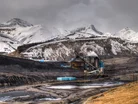KPMG: Canada Critical Minerals Mining 'Needs tax Breaks'

The vast majority (91%) of Canadian mining leaders believe the country can be a world leader in critical minerals but only with adequate government backing, a KPMG survey has found.
The KMPG survey – 'Why critical minerals require more of everything' – shows that, although Canada’s mining leaders see potential for huge success in critical minerals, the overwhelming majority (98%) say their companies require more investment, government commitment and favourable tax policies to support its growth.
Critical minerals are the building blocks for the green and digital economy. These include:
- Copper (electricity)
- Manganese, platinum and rare earth magnets (wind turbines)
- Uranium (nuclear power)
- Lithium, cobalt and nickel (electric vehicles)
- Indium and tellurium (solar panels)
Critical minerals offer a generational opportunity for Canada in the areas of exploration, extraction, processing, downstream product manufacturing and recycling.
The Canadian government is on record as saying it is “committed to seizing this opportunity in a way that benefits every region across the country”.
But Heather Cheeseman – Partner, and National Mining Leader for KPMG in Canada – says that although Canada has “put its stake in the ground on critical minerals” the survey shows it is clear “the industry requires much more support before Canada can be a viable and sustainable global player in the transition to a green economy”.
She adds: “While more than nine in 10 mining decision makers are optimistic about the potential for growth, mining companies are having to deal with many unique challenges, including permitting delays, reducing their carbon footprint, and the ongoing challenge of raising capital. Slumping commodity prices is making it all the more challenging.”
The survey shows Canadian mining and exploration companies agree that their most-pressing challenges are:
- Identifying and mitigating ESG risks
- Raising capital
- Reducing costs
- Overcoming regulatory hurdles
Another pain point respondents highlight are timelines that allow the time needed to obtain the ‘right to operate’.
KPMG: Canada mining leaders want government support
In Canada, if a company wants to explore a mineral property, it must first obtain exploration rights in line with relevant provincial or territorial mining legislation. This is granted on a first-come, first-served basis.
Another issue flagged by mining leaders is decarbonisation, with respondents saying they expect increased scrutiny from investors on decarbonisation strategies.
The survey shows fewer than a quarter (23%) have made formal commitments to achieve all Scope-related carbon emission reductions by 2050 or earlier.
Scope emissions are classified in three groups: 1, 2 and 3. Scope 1 covers emissions from sources an organisation owns or controls directly, while Scope 2 are emissions a company causes indirectly, and come from where the energy it purchases and uses is produced. Scope 3 emissions are those not produced by the company itself and are not the result of activities from assets owned or controlled by them, but by those that it’s indirectly responsible for up and down its value chain.
About a quarter (24%) have not yet made formal commitments but are working on a plan to reduce emissions, while 10% have neither an ESG or a carbon reduction strategy. Meanwhile 7% do not plan to have one or cannot reduce emissions at this time.
Cheeseman adds: “The pace of decarbonisation depends on the company’s size, carbon footprint, and resources, but many in the industry face substantial hurdles to reducing Scope 3 emissions in particular.
“Because Canada has relatively little smelting or refining capacity for most critical minerals, the intermediary minerals Canada produces are shipped to smelters around the world. Until Canada has the capacity to smelt or refine what’s mined here, the miners will be limited in what they can do.”
